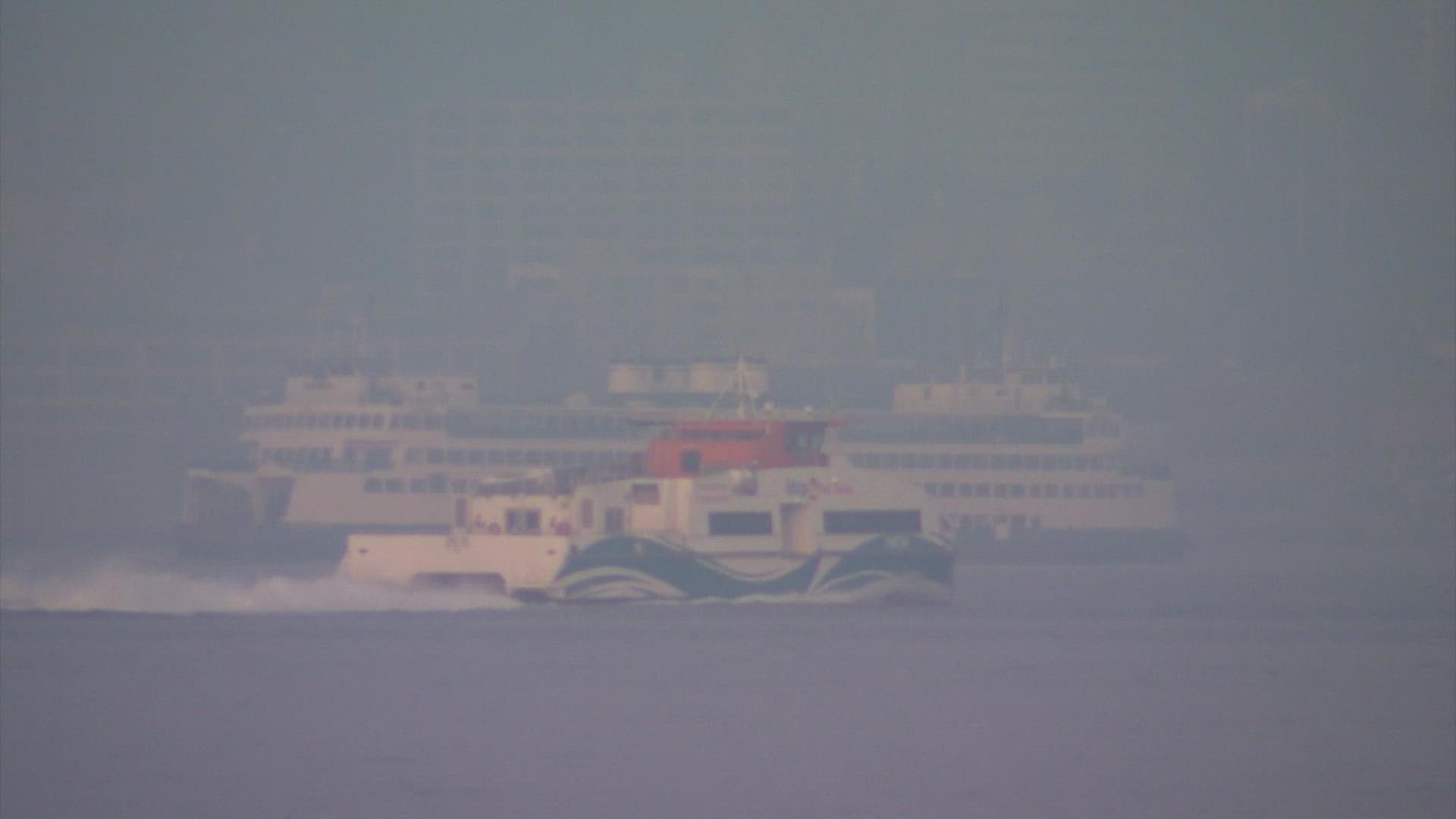SEATTLE — Air quality across the Puget Sound region has worsened this week, as multiple wildfires continue to burn across the state.
Is there relief in sight? And what health effects can prolonged exposure to wildfire smoke cause?
We have the answers to your popular wildfire smoke questions.
Why is the air quality so bad in Washington?
Multiple wildfires in the Cascades caused unhealthy to very unhealthy air quality across western Washington, including in King, Snohomish, and Pierce counties on Wednesday. One of those is the Bolt Creek Fire burning off U.S. 2 near Skykomish.
"We’re unlucky because we had a fire start right outside Seattle, and we’re in the direct outflow of that fire," said Phil Swartzendruber, an air quality specialist with Puget Sound Clean Air Agency. "We’re getting a direct hit of smoke."
On Thursday morning, Seattle's air quality was among the worst of any place in the world, according to IQAir's Air Quality and pollution city rankings.
The air quality in the region was measured at 245 on the Air Quality Index (AQI) at 11 a.m. Thursday. Seattle was ranked at number one earlier in the day ahead of Portland, Ore.; Bejing, China; Delhi, India; and Lahore, Pakistan.
An Air Quality Alert is in effect through Thursday evening for Seattle.
The Puget Sound Clean Air Agency urged people to stay inside and released a map Wednesday showing the areas most affected by the smoky conditions.
KING 5 Chief Meteorologist Mike Everett said Wednesday’s air quality is the worst it's been in recent weeks, but a few years in the mid-1980s hit record levels.
“The big change between now and the mid-80s is that we've put a lot of regulations in place to stop pumping chlorofluorocarbons up into the atmosphere with cars and industry, but we're seeing wildfires become more frequent and more dense and see wildfire season lasting longer. There's an intersection taking place where in one way it's better in another way it’s worse,” said Everett.
What are the symptoms of smoke exposure? Can wildfire smoke cause headaches?
Yes, unhealthy air quality can cause health symptoms like itchy eyes, sore throat, fatigue, headache, coughing, and shortness of breath. More serious symptoms for at-risk groups include aggravation of existent heart and lung diseases, with symptoms including asthma attacks, chest pain or irregular heartbeats.
“What we really worry about is people with underlying heart or lung conditions that can worsen those and result in asthma or COPD, exacerbations and potentially aggravating the heart as well,” said Dr. Cora Sack, a pulmonologist at the UW Medicine in the Department of Medicine and Department of Environmental and Occupational Health Sciences.
The Washington Department of Health said long periods of wildfire smoke can impact mental and behavioral health, too.
Because it is recommended to limit the time spent outside, the DOH said extended periods of poor air quality could lead to feelings of isolation from staying inside or sadness from the lack of sunshine.
State officials recommend checking in with loved ones during wildfire smoke episodes, spending time in areas of the home that have cleaner air, or going to a public space with your family. Building a DIY box fan with filters and getting light exercise indoors are also recommended.
“It’s a serious amount of smoke and people should be taking action to reduce their exposure,” Swartzendruber said.
The DOH said to avoid vacuuming in your home unless the vacuum has a HEPA filter because particles can stir up. Also, set the air conditioning to recirculate.
If you must be outside, it is recommended to wear a properly fitted NIOSH-approved particulate respirator, such as an N95 mask.
Wildfire smoke and pregnancy
Sack said older adults, pregnant women and younger children are at a higher risk.
The mother and fetus are at increased risk of health effects, according to the DOH.
“People should limit the amount of time they're doing strenuous activity outdoors,” Sack said.
The Centers for Disease Control and Prevention also recommends that pregnant women and other vulnerable groups avoid cooking inside when air quality is lowest, especially frying or grilling food, as that can contribute to indoor air pollutants.
Where is the smoke coming from?
Multiple fires, including the Chilliwack Area and Bolt Creek, are the cause of all the smoke. Crews are fighting the Bolt Creek Fire with a consumption strategy, essentially allowing the fire to burn, which reduces erosion and creates safer conditions for those crews.
The Nakia Creek Fire in Clark County is affecting air quality in southeastern Washington.
When will the smoke clear?
A fall storm is forecasted to bring 1 inch of rain this weekend to help clear the smoke and improve the air quality. The first in a series of fronts are expected to move in Friday morning.
However, it's hard to say how long it will take for all the smoke to clear. Swartzendruber said if it's a slow rain, it could take hours or even a day or two to get back to good air quality. It also depends on how windy it is as onshore flow helps blow all the smoke out, as well.

